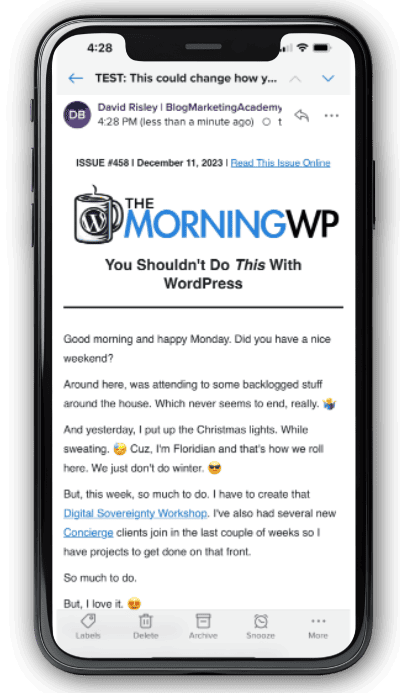I want to tell you a story.
Back before I had any form of public reputation as a blogger, I made some money by doing programming work. In fact, even as I was running PCMech, I was doing client web development on the side to earn more money. PHP/MySQL development was my thing.
As things evolved with PCMech, I saw the need for some kind of content management system. See, I began PCMech in the days where we were manually creating HTML files and linking them together. I’d use Microsoft Frontpage to manage things as a site and hopefully keep everything working. I eventually evolved to using server side includes to make certain things common and make site changes not such a pain in the butt. But, I needed a real CMS.
So, I began making one myself. I put all kinds of work into the thing and was using it to power my own site. Then, it dawned on me that I could probably make some money with it. So, I called it Miraserver and began to sell licenses.

It didn’t go super well. For one, there were already a lot of decent CMS’s out there. Secondly, I was so busy doing all the programming work on my own that I didn’t have much time to market anything (not that I knew much about marketing at the time anyway).
Before long, the world of CMS had totally changed. There were some really powerful open source solutions out there (i.e. Wordpress). How am I supposed to compete against that?
Here’s the other problem, though. I was the ONLY person in the world that knew how Miraserver worked. I created it myself. I didn’t create any documentation. I wasn’t using any in-code comments that were worth a damn. I wasn’t using any version control (which would allow others to work on it without messing it up). In short, I was a 1-man machine spinning my wheels going nowhere.
Fast forward to today and…
- Miraserver is dead as a product. I have zero plans to continue doing anything with it and the code base has been stalled in development for over 5 years now (at least).
- I don’t even use my own CMS anymore. Why would I? When you have such an awesome solution as Wordpress, why bother with what is comparatively a piece of crap that only I know how to work with?
- I wasted a lot of time.
Miraserver is one of those business ideas that, in and of itself, I look on as a failure. However, the lessons I learned from that experience were very important. And they are:
- Never re-invent the wheel. I should have just used a decent system created by somebody else. Moving away from Miraserver and onto Wordpress was one of the best decisions I ever made. Never pigeon-hole yourself into anything in which you can’t get out of it, and me using my own CMS that only I knew how to use – that’s about as bad as it gets.
- Speed to market is very important. Since I was doing it all myself, adding new features to Miraserver was a slow process. While I was busy messing around with the code, the market had completely changed to the point where my project wasn’t even competitive with the freebies out there. So, whatever you’re going to do, do it fast. Things change quickly online.
- Don’t do it all yourself. I really had no damn business hand-coding my own CMS. I should never have done it. But, even if I still wanted to launch my own CMS, I should have just paid somebody to create a solution that worked for me. The hours wasted coding and figuring things out – yikes.
Today, I apply these lessons primarily in these simple ways:
- Always use solutions which have already been created and are supported. This is why I use Wordpress and NEVER hack anything. If it can’t be done with an out-of-box solution or a plug-in, I probably won’t do it.
- Outsource, outsource, outsource. If you think you can’t afford it, then think about what you LOSE by not doing it. Think about how much faster you can grow your business if not every single thing depends on you. Don’t look at outsourcing as a mere expense. Instead, look at it as fast-track to growth, because done right that’s exactly what it will be.
We all have stories of failure. The trick of it, though, is not to stop. Take the lessons learned and move on to apply them to the next endeavor.
Do you have any failure stories that have shaped what you do today? Share them in the comments.
Got A Question? Need Some Assistance?
Have a question about this article? Need some help with this topic (or anything else)? Send it in and I’ll get back to you personally. If you’re OK with it, I might even use it as the basis of future content so I can make this site most useful.



